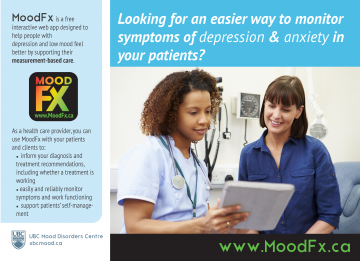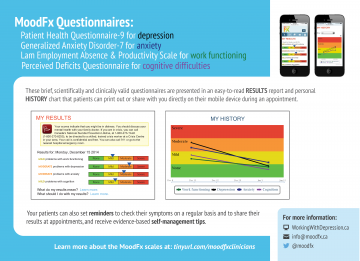MoodFX (pronounced Mood Effects) is a free online tool that helps to empower patients and clients to easily screen for and monitor symptoms of depression and related difficulties with anxiety, cognition, and work performance.
MoodFX can be used in conjunction with health care and allied health professionals, including family physicians, psychiatrists, registered psychologists, counselors, clinical social workers, and others.
This page provides a brief introduction to MoodFX and its potential for use in clinical practice.
 Randomized controlled trial (RCT) shows effectiveness of MoodFX to improve depression outcomes!
Randomized controlled trial (RCT) shows effectiveness of MoodFX to improve depression outcomes!
Background: e-Health tools using validated questionnaires to assess outcomes may facilitate measurement-based care for psychiatric disorders. MoodFX was created as a free online symptom tracker to support patients for outcome measurement in their depression treatment. We conducted a pilot randomized evaluation to examine its usability, and clinical utility.
Methods: Patients presenting with a major depressive episode (within a major depressive or bipolar disorder) were randomly assigned to receive either MoodFX or a health information website as the intervention and control condition, respectively, with follow-up assessment surveys conducted online at baseline, 8 weeks and 6 months. The primary usability outcomes included the percentage of patients with self-reported use of MoodFX 3 or more times during follow up (indicating minimally adequate usage) and usability measures based on the System Usability Scale (SUS). Secondary clinical outcomes included the Quick Inventory of Depressive Symptomatology, Self-Rated (QIDS-SR) and Patient Health Questionnaire (PHQ-9).
Results: Forty-nine participants were randomized (24 to MoodFX and 25 to the control condition). Of the 23 participants randomized to MoodFX who completed the user survey, 18 (78%) used MoodFX 3 or more times over the 6 months of the study. The mean SUS score of 72.7 (65th-69th percentile) represents good usability. Compared to the control group, the MoodFX group had significantly better improvement on QIDS-SR and PHQ-9 scores, with large effect sizes and higher response rates at 6 months. There were no differences between conditions on other secondary outcomes such as functioning and quality of life.
Conclusion: MoodFX demonstrated good usability and was associated with reduction in depressive symptoms. This pilot study supports the use of digital tools in depression treatment.
What is MoodFX?
MoodFX is a free web app (www.MoodFX.ca) designed to help people with mood problems by screening for clinical depression and anxiety and supporting their measurement-based care. Developed by the Mood Disorders Centre (www.ubcmood.ca) and eHealth Strategy Office (now Digital Emergency Medicine, www.digem.med.ubc.ca) at the University of British Columbia, MoodFX uses validated, clinically useful self-report questionnaires for monitoring depression outcomes. These questionnaires include:
- Patient Health Questionnaire-9 (PHQ-9) for depression
- Generalized Anxiety Disorder Questionnaire-7 (GAD-7) for general anxiety
- Lam Employment Absence and Productivity Scale (LEAPS) for work functioning (9 questions)
- Perceived Deficits Questionnaire-5 (PDQ-5) for cognition
- The Clinically Useful Depression Outcome Scale (CUDOS) items on general functioning and quality of life (2 questions)
- The Frequency, Intensity, and Burden of Side-Effects Rating Scale (FIBSER), to assess side-effects to medication for depression and anxiety (3 questions)
MoodFX and Measurement-Based Care
Users respond to these brief questionnaires and receive comprehensive, easy-to-understand reports of their results that they can then share with their healthcare provider(s). For example, a score of 10 or higher on the PHQ-9 or GAD-7 indicates clinically significant depression and anxiety. Users can also view and print a personal History chart showing how their symptoms have changed over time, e.g., to monitor improvement with treatment. MoodFX can also help patients self-manage their depression by providing weekly self-care tips and an up-to-date list of trusted online resources.
Please feel free to contact us with any questions or feedback about MoodFX at info@moodfx.ca—we’d love to hear from you.
About measurement-based care for depression:
MoodFX Survey Results
We conducted a survey from the first 64 users of MoodFX, with results summarized in this presentation by Dr. Lam.
Overall, 70% of users agreed or strongly agreed that MoodFX was helpful for them.

